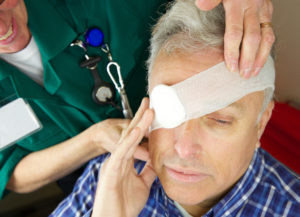
Vision is your most dominant sense. Scientists estimate that 80% of the information your brain receives comes through your eyes.
When you injure your eyes in an accident, you could suffer significant temporary or permanent disabilities. Activities that you take for granted, like driving, cooking, and shopping, will require new skills or someone else’s assistance to complete.
Here is an overview of eye injuries and the case you can build for compensation after an eye injury.
Table of Contents
How Do Your Eyes Work?

Your eyes gather visual information for your brain, which then uses this information along with your other senses to decide how to control your body. If you want to pick something up, your brain uses images captured by your eyes to properly move your hand to the object and grasp it.
Your eyeball, also called a globe, sits in your eye socket, or your orbital, which contains seven orbital bones that protect your eye and hold it in correct alignment with your other eye to give you three-dimensional vision.
The muscles that control your eye movement anchor your eye to your orbital. The nerves and blood vessels that connect to your eye also pass through openings in the orbital.
Your eyes gather both direct and reflected light. This light passes through the cornea, a transparent covering that protects your iris and pupil, and begins bending light to focus it.
Light passes through your pupil into the interior of your eye. The iris controls your pupil to allow a measured amount of light to enter. In bright lighting, the iris contracts your pupils to protect the sensitive retina. In dim lighting, the iris dilates your pupils so your eye can gather enough light to see.
A lens sits behind your pupil and changes shape to focus light onto your retina, a light-sensitive nerve ending. The retina detects light and color and converts those sensations into nerve signals that travel along the optic nerve to the brain. The visual centers of the brain reassemble these nerve signals into an image.
What Causes Eye Injuries?
Eye injuries result from trauma to the eye. This trauma can take many forms, including:
Debris
Foreign objects can get into the space around your eye and injure it, even if the debris does not penetrate the globe. For instance, residues or rubble can get tangled in the muscles that control the eye or sever a nerve or blood vessel that runs to the eye or the surrounding tissue.
You can get debris in your eye in almost any type of accident. Dirt and gravel can get into your eye during a motorcycle accident. Similarly, shards of glass can fly into your eye in a car accident.
Penetrating Trauma
Penetrating trauma happens when an object pierces the eye, leaving an open wound. These injuries can cause severe damage, particularly when the item penetrates the globe.
Penetrating trauma can happen in workplace accidents. Even if you wear safety glasses, a high-speed object or tool can be ejected into your eye, penetrating it.
Blunt Trauma
Blunt trauma can occur if you or something else hits your eye without leaving an open wound. You can suffer blunt trauma to your face and eyes if you hit your head on your side window during a car accident.
Burns
Burns happen when a chemical reaction destroys tissue.
A burn to your eye can occur as a result of any of the following:
- Hot objects
- Flames
- Caustic chemicals
- Radiation, including sunlight
- Electrical currents
Burns also happen in the workplace. Acids, cleaning products, hot oil, and other substances can splash into the eyes and harm them.
What Are Some Examples of Eye Injuries?
Eye injuries can take many forms depending on the tissue that gets torn. The type of eye injury will determine both its treatment and the long-term prognosis for your vision.
Corneal Abrasion
A corneal abrasion happens when an object or debris scratches the cornea.
Symptoms of a corneal abrasion include:
- Pain
- Redness
- Tears
- Blurry vision
These injuries usually heal with home care, but you should visit a doctor to eliminate the possibility of other, more severe impairments. A doctor can also prescribe antibiotic eye drops to prevent infections.
Burns
Burns to the eye can cause temporary or permanent harm to the eye, eyelid, and muscles controlling the eye. In many cases, first aid will provide critical early treatment by stopping the damage from worsening. When you suffer a burn, you should flush your eye thoroughly to clear away any caustic substances and cool the eye tissue.
Fractured Orbital
A fractured orbital often results from a blunt blow to the head. A fractured orbital can cause significant eye impairment and facial disfigurement.
When you fracture your orbital, bone fragments can pierce your globe and tear the muscles, nerves, and blood vessels attached to the globe.
Depending on which bones are fractured, your eye may move out of its optimal position and end up misaligned, leading to one eye sitting lower than the other or pointing in a different direction from the other eye.
Ruptured Globe
When an object penetrates the globe, it can rupture. The fluid inside the globe can leak, causing the globe to become misshapen. A ruptured globe almost always results in at least some loss of vision.
To repair a ruptured globe, a doctor must operate on your eye to close the leak. If the doctor cannot fix the eye, the doctor may have to remove it.
How Do You Get Compensation for an Eye Injury?
You can seek compensation if you’ve suffered an eye injury due to someone else’s actions. To do so, you must prove that the other person acted intentionally or negligently in causing your injuries.
Injury compensation can cover both your economic and non-economic losses. Financial losses include expenses for treatment, vision therapy, and medication and also cover lost income and diminished earning capacity due to vision loss. Non-economic losses include your reduced quality of life due to your eye injury and any loss of vision.
Eye injuries can impair your most important sense. When you lose visual acuity, you can lose your ability to work, care for yourself, and participate in activities you enjoy. Reach out to the team at Shaked Law Personal Injury Lawyers for a free consultation to discuss the compensation you may be entitled to seek for these and other effects of an eye injury. Call us at (305) 937-0191.
